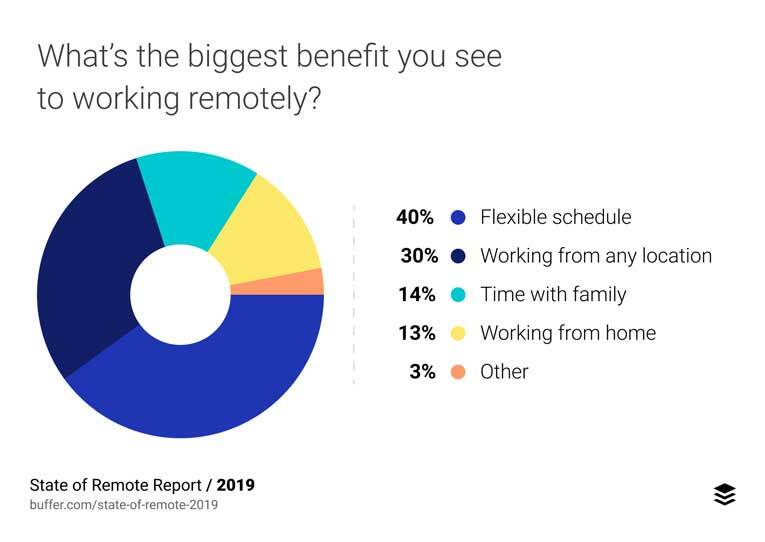What is a virtual office?
25 Nov 2019

With more and more people picking up remote work, the traditional office is no longer a viable option for many workers.
The arrival of the internet has meant that companies can employ staff from all over the world without having them come into a physical office, and people have been able to start businesses from their basements.
But, while it’s all well and good working from home in the comfort of your pyjamas with Netflix on in the background, it’s not exactly the most professional set up.
Cue the entrance of virtual offices.
They provide a cheaper and more flexible option than physical office spaces, as well as offer some major benefits for both one-man band businesses and larger companies that are dispersed around the world.
For small businesses and startups, the cost of renting a physical office space just isn’t financially do-able, especially in the early days. But it’s important to have a professional space to bring clients and host meetings in rather than just staking out a corner in your local coffee shop.
This article covers
What is a virtual office?
A virtual office does pretty much as it says on the tin.
It doesn’t always mean a physical workspace, although some are often joined together with coworking spaces to provide hotdesks for users. Rather, it’s a selection of office-based services that business owners can pay a fee for each month to access.
These services include things like a city centre postal address, mail handling services, a business phone number, reception desk services, and access to professional meeting rooms and video conferencing equipment.
Essentially, a virtual office is a service that allows you to work remotely by providing you with a number of different business functions through the internet. One of the biggest bonuses is that it lets businesses set up a presence in their location of choice without needing to pay rent for an actual space in that area.
For example, if you want to have a Southwest London postcode but can nowhere near afford to rent an office there, signing up for a virtual office in Southwest London will provide you with that much-coveted postcode for your business.
Who can benefit from a virtual office?
Virtual offices can provide many different benefits for many different people - it simply depends on the kind of business you run and what services you need for it to function properly and professionally.
However, they offer the most benefits for:
- Entrepreneurs and small business owners that have been building their businesses from home. A virtual office serves as a stepping stone towards a physical office space without the huge price tag and commitment.
- Business owners that want to give their business a more professional image but aren’t quite ready to take the leap and rent a full-time office space.
- Business owners that already work in an office but are finding it a strain on their finances.
- Business owners that have staff members scattered around the world.
The benefits of using a virtual office
Again, the benefits of a virtual office will differ from business to business, but there are several across-the-board benefits that they provide.
1. A roster of dedicated services
The great thing about virtual offices is there tends to be a pick and mix of services, which means you can hand select the ones that are most appropriate for your business.
For example, if you need a telephone answering service, you can add that to your list of monthly services, or if you are in dire need of video conferencing facilities you can choose a virtual office that has that facility.
2. A professional presence
One of the biggest benefits of a virtual office is getting a business address and phone number specifically for your business. This sends out a far more professional and trustworthy image than having your home address plastered all over your business collateral.
They can also provide a professional space for you to meet clients rather than hoping there’s a table free in your local coffee shop.
3. Cheaper costs
If money is playing on your mind, virtual offices can ease the pain. They are often cheaper than coworking spaces and are dramatically cheaper than a traditional, physical office but still come with the same perks.
4. More flexibility and productivity
When you have a physical office, you might feel the need to be there all the time to make the most of it. However, with a virtual office, you’re not tied to a single location.
In fact, your virtual office can “travel” with you (or, at least, you can access most of the services) wherever you go as long as you’re connected to the internet.

5. An unlimited workforce
If you’re at the hiring stage with your business, virtual offices mean you don’t have to limit yourself to candidates in close proximity.
Instead, you can hire remote workers from all over the world that can all tap into the benefits provided by your virtual office.
The cost of a virtual office
If you’re into the idea of a virtual office, you’re probably wondering what the cost is going to be. As a general rule, you pay monthly to access virtual office services, and the overall price will depend on what services you pick for your package. Costs can start at as little as £10-£20 a month.
Regus is one of the biggest virtual office providers, and they offer three distinct packages that come in at different price points:
- Professional Address Package - having just a professional business address and mail handling services with Regus costs from £27 a month
- Virtual Office Package - this comes with everything from the Professional Address Package as well as a business phone number with a live receptionist and unlimited use of the business lounges and costs from £84 a month
- Virtual Office Plus Package - the biggest package comes with everything from the above packages as well as five days use of a private office or coworking space each month. This package costs from £131 a month
As you can see, the more services and extras you add onto your package, the higher the price, so determine what your business needs from a virtual office and go from there.
A virtual office might be the perfect solution for you
Virtual offices are gaining popularity as we move closer to a remote workforce. They can be a cheaper option than renting a coworking space and they are far cheaper than investing in a physical office, particularly if your business is new.
As well as providing your business with a professional address and phone number, you can also get a live receptionist to handle phone calls and other bonuses, like video conferencing facilities and meeting rooms.


